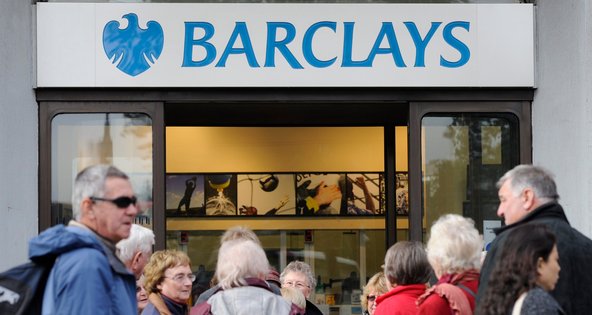 Facundo Arrizabalaga/European Pressphoto AgencyA branch of Barclays in London. On Wednesday, the British bank posted a net loss of £106 million ($170 million) in its latest earnings report.
Facundo Arrizabalaga/European Pressphoto AgencyA branch of Barclays in London. On Wednesday, the British bank posted a net loss of £106 million ($170 million) in its latest earnings report.
LONDON — The British bank Barclays disclosed on Wednesday that it faced two new investigations by American authorities, including one examining whether the company had violated anticorruption laws in its capital-raising efforts during the financial crisis. The news further hurt the share price as the bank reported weak third-quarter results.
The new joint investigation from the Justice Department and the Securities and Exchange Commission on the bank’s capital-raising efforts follows similar efforts by British regulators. The Federal Energy Regulatory Commission is also investigating the past energy trading activity in the bank’s American operations. The commission’s staff on Wednesday recommended taking action against the bank and levying a $470 million fine. Barclays, which has 30 days to respond to the commission, has said it would defend itself against the inquiry.
Related Links
The new legal woes, coming on the heels of a rate-rigging scandal that erupted this summer, complicate a difficult turnaround effort by the bank.
On Wednesday, Barclays posted a net loss of £106 million (about $170 million) in the three months ended Sept. 30, a steep drop from a £1.4 billion net profit it reported in the period a year earlier. The results were hurt by a charge on its own debt and provisions connected to the inappropriate sale of insurance to clients.
Libor Explained
 Justin Thomas/VisualMedia, via Agence France-Presse — Getty ImagesAntony Jenkins, chief of Barclays.
Justin Thomas/VisualMedia, via Agence France-Presse — Getty ImagesAntony Jenkins, chief of Barclays.
“The last three months have been difficult for Barclays,” Antony P. Jenkins, the bank’s chief executive, said on a conference call with reporters.
Shares in Barclays fell 4.7 percent in trading on Wednesday in London.
Mr. Jenkins took over as chief executive from Robert E. Diamond Jr., who resigned in July after Barclays agreed to pay $450 million to settle charges that it had tried to manipulate a key benchmark, the London interbank offered rate, or Libor. In the aftermath, Mr. Jenkins promised to increase the focus on retail banking, shifting away from riskier activity in the firm’s investment banking unit.
Unlike the Royal Bank of Scotland Group and the Lloyds Banking Group, Barclays turned to sovereign wealth funds in Abu Dhabi and Qatar for new capital during the financial crisis. Barclays raised a total of $7.1 billion from Qatar in July and October 2008.
The bank disclosed this year that British authorities were investigating the legality of payments to Qatari investors in connection with the bank’s capital-raising. Barclays said on Wednesday that American regulators were also pursuing similar inquiries, adding that the bank was cooperating.
Despite its net loss, Barclays is making progress as its underlying businesses show signs of improvement. Excluding the adjustments, Barclays said pretax profit rose 29 percent, to £1.7 billion, in the third quarter.
In the face of continued market volatility, Barclays said pretax profit in its investment and corporate banking division more than doubled in the quarter, to just over £1 billion, on a strong performance in fixed income and equities. The European debt crisis, however, weighed on the bank’s retail and business banking franchise, where pretax profit fell 31 percent, to £794 million.
Ian Gordon, a banking analyst at Investec Securities in London, said the decline in revenue in the investment banking division raised some questions about the unit’s performance. He added, however, that Barclays was in a position to win market share, as competitors like UBS moved to reduce trading activity.
“As others pull back,” Mr. Gordon said, “there’s a potential to win a greater share of the piece.”
Barclays warned, however, that difficulties in Europe and uncertainty in global markets could weigh on future profitability. “We continue to be cautious about the environment in which we operate,” the bank said in a statement.
Given the challenging environment, Barclays is moving to insulate its businesses. The bank said it had reduced its presence in heavily indebted countries. The bank said it had cut its exposure to the sovereign debt of Spain, Italy, Portugal, Greece and Cyprus by 15 percent, to £4.8 billion.
It is also bolstering its capital to protect against potential losses. The bank’s core Tier 1 ratio, a measure of its ability to weather financial shocks, rose to 11.2 percent at the end of September from 10.9 percent at the end of the second quarter.
This post has been revised to reflect the following correction:
Correction: October 31, 2012
An earlier version of this article misstated the pretax profit Barclays attributed to its retail and business banking franchise. It was £794 million, not £794.
Article source: http://dealbook.nytimes.com/2012/10/31/barclays-reports-third-quarter-loss-on-credit-charges/?partner=rss&emc=rss
Speak Your Mind
You must be logged in to post a comment.